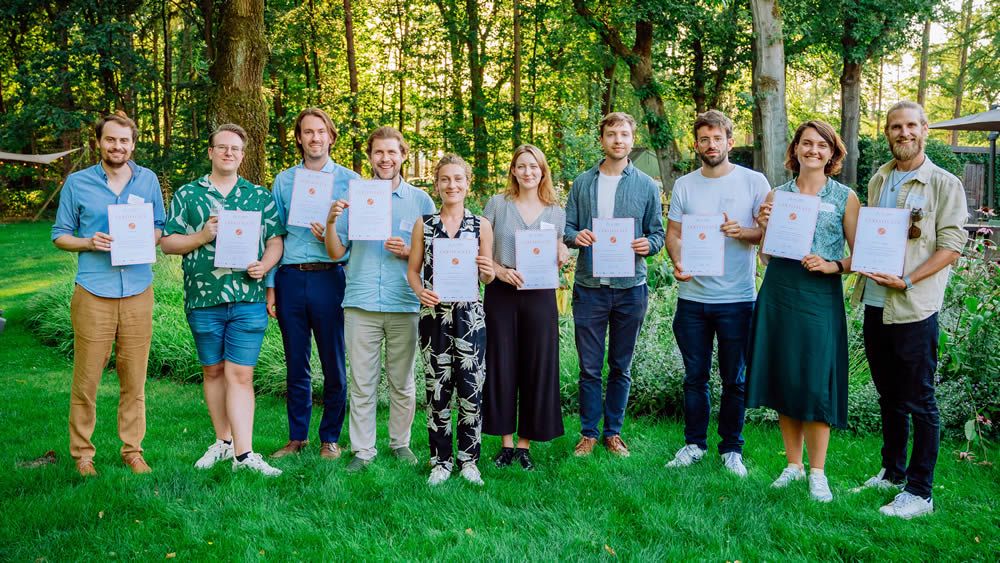Transdisciplinary Training Program
SCOOP has its own transdisciplinary, four-year PhD training program, consisting of 7.5 ECTs (17 training days), that forms part of the four-year SCOOP PhD research studentship. This equals between 187 and 210 hours of work (i.e. 14 to 16 hours per training day, including the day itself).Participation in all parts of this program is mandatory for all PhD students of the SCOOP consortium and is followed in addition to the training program of the disciplinary research school.In this way, it is assured that PhD students broaden both their disciplinary and interdisciplinary horizons. After completing the SCOOP PhD training program, PhD students will receive a certificate.

SCOOP PhD Training Program Certificate Completion
The SCOOP TDPP facilitates the development of uniquely skilled transdisciplinary researchers who are well-equipped to continue and innovate research that addresses complex, pressing current and future societal challenges. This program is an essential part of the SCOOP PhD student’s trajectory; hence all PhD students are expected to attend the training days.
The SCOOP Transdisciplinary Training Program (TDPP) consists of four courses that roughly correspond to the year of the PhD research studentship. This course program is further complemented by regular meetings of the four work packages (each project is part of at least one work package), during which participants present and discuss their work, as well as annual master classes that take place during the yearly SCOOP conference. Each year of the TDPP corresponds to one course that a SCOOP PhD student will need to take. That is, first year PhD students will undertake course 1, second year PhD students will undertake course 2, third undertake course 3, and fourth year course 4. Each of these courses will contain between 2 and 6 workshops that will take place within that academic year.
Course 1: The SCOOP Approach
The first course, The SCOOP Approach, gives a general overview over the SCOOP approach. It consists of six course days. The emphasis of each course day is to give general overviews over the key pillars of our analytical framework. We start with an introductory overview over the framework itself (workshop 1). The following three course days are dedicated to an in-depth inquiry into the phenomenon of sustainable cooperation, its key dimensions (stability and value creation) and current institutional and behavioral explanations. The stability dimension of sustainable cooperation, in particular different threats to sustainable cooperation are the focus of workshop 2. The value-dimension of sustainable cooperation, including intended and unintended outcomes of cooperative endeavors are the topic of workshop 3. This is followed by an overview over current theories of (sustainable) cooperation, in particular institutional and behavioral theories (workshop 4). Subsequently, we focus on the policy domains work, care, and inclusion, in order to illustrate transdisciplinary diagnoses of resilience problems (workshop 5). We conclude with an inquiry the challenges involved when crossing disciplinary boundaries (workshop 6).
Course 2: SCOOP Analysis and Applications
Course 3: Transdisciplinarity in Practice
Existing arrangements to secure sustainable cooperation may also founder because of spillover. Strategies to cope with a new reality in one domain (e.g., families) can have negative or positive effects on provisions facilitating cooperation elsewhere (e.g., communities, organizations). Work-home interference is a prominent example of this kind of problem: high-performance human resource management practices may trigger employees’ willingness to work overtime at the expense of commitments at home. For example, throughout history, the development of a state-coordinated welfare system for care decreased the need for other forms of (citizen-led) initiatives. Of course, spillover can also result in mutual reinforcement of cooperative arrangements in both domains, for example as is the case when flexible work-hour policies facilitate employees meeting their care duties.
These kinds of spillover processes are an important reason why some arrangements are vulnerable or untenable, and why others thrive. Making cooperation sustainable requires that investments in one domain are compatible with requirements of others, or even have positive side effects. Cooperation will only truly contribute to a resilient society if it is achieved across, as well as within, these domains. How are the institutional arrangements of families, communities, and organizations interrelated, and how do these arrangements allow for accommodating the changing socio-economic and technological circumstances? We need to know how to prevent and mitigate negative cross-domain spillover effects; we also need fundamental insights into how to design institutional arrangements in which processes in one domain enhance value creation in the others.




